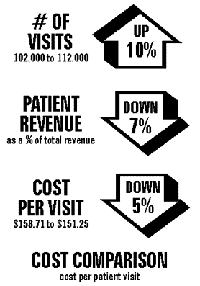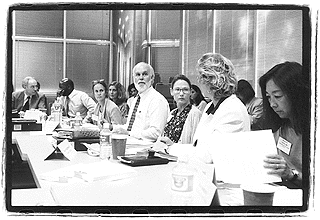https://www.austinchronicle.com/news/1997-09-19/518447/
Health Scare
Citizen Group Looks Out for Health Clinics
By Audrey Duff, September 19, 1997, News
|
The Indigent Care Work Team includes citizens from various health fields and organizations who will help determine the fate of the city's health clinics. Chair David Evans is at center, and Nurse Stephanie Tabone is on his right. photograph by John Anderson |
At last month's meeting of the Indigent Care Work Team -- the body of 19 professionals who have volunteered to make recommendations on how to keep Austin's health clinic system viable -- Dr. Chris Fabre voiced a concern that has become a theme among such citizen boards and commissions. He said he was worried that the way information will be presented to the council concerning the city-owned entities will set the stage for selling them off.
"The health clinics are a very fine system, but the way it's been set up, the [consultants'] report just points out the bad things," said Fabre, who is a member of the Indigent Care Team. "Not one of these recommendations by Osborne say `Junk it,' but when the council reads this -- and they'll listen to Osborne -- they won't see any of the good things."
Fabre had a point. Nowhere in the draft report done by the outside consultants -- The Osborne Consulting Group, Inc. -- did it say that the clinics were providing high quality service. Orally, however, during their presentation, the consultants made that point time and again.
Fabre made a suggestion that an executive summary be included at the beginning of the report to note the clinic's high performance, and other team members agreed. Assistant City Manager Marcia Conner, who oversees the clinics system, admitted that she had told The Osborne Group not to include such a summary because it did not seem the place for it.
A small thing, to be sure, but just the kind of oversight that keeps the privatization conspiracy theories alive. Fair or not, it's a common refrain that citizen board and commission members often believe that their meetings and recommendations are merely window dressings -- that city staff has already decided on a course of action. In the case of the Indigent Care Team, the suspicion is that as soon as Team members make their recommendations, city staff will pat them on the head, say "Thank you very much," and then pull out a set of recommendations hidden in the top drawer that staff has been waiting to make all along. "That's what happened with Brack," says one Indigent Care Team member. "The community made a set of recommendations which the city council and manager chose to disregard." The result: In 1995, Seton Medical Center was awarded a 30-year lease to run Austin-owned Brackenridge Hospital.
No wonder public clinic advocates are nervous. Ever since former Mayor Bruce Todd first began beating the drum of privatization, Austin/Travis County's 12 clinics -- all of which are Federally Qualified Health Care Centers (FQHCs) -- have been under the gun. According to the Osborne report, the cost of providing needed services is escalating at a higher pace than are revenues from paying patients, and to make matters worse, the federal government is expected to eliminate FQHC status (and with it the cost-based reimbursement) and subject health centers to prices based on market forces.
That public clinics must overhaul themselves in order to compete in this lean, mean, managed care climate is a given. But the decision on whether or not to sell them off is not so cut-and-dried. Those who favor privatization -- which could indeed save the city money -- say that the clinics are outmoded and helplessly inefficient, and that the fix-it job is more than the city can handle. Public health clinic advocates worry that if the clinics -- which provide care to Austin's indigent and working poor populations -- are handed over to a private company, profits will take precedence over preventive, holistic health care.
"In the short term, privatization saves money," notes Citizens' Health Care Network member Rose Lancaster, who also serves on the Indigent Care Work Team. "But preventive care, which saves money for the city in the long run, is what gets left out."
To bolster arguments that city staff has a predetermined privatization policy, critics point out that management of the clinics has been left to falter -- the administrative coordinator position for the clinics was eliminated and the current director position was left vacant from October 1996 to July 1997. The Indigent Care Team itself was formed by the city council only after citizens groused that the board that city staff had originally put together to make recommendations was stacked with, well, city staff. Conner's original version of the task force, presented to council a year ago, included no clinic workers, doctors, or public health care advocates. "We complained bitterly about that," Lancaster says, and the situation was eventually rectified with the formation of the Indigent Care Work Team.
| TRACKING MEDICAL ENCOUNTERS |
 |
| Austin Clinics ----$151.25 |
| Texas Clinics- $73.44 |
| All Cinics -----$93.82 |
| The Osborne Group's draft report compares figures from FY 1995 to FY 1996. Key findings include the fact that more patients are visiting the clinics while the percentage of the total revenue they bring in has decreased. And while the total cost per patient encounter has declined, it is still high compared to other Federally Qualified Health Care Centers in Texas and the nation. |
Council, lead by Beverly Griffith and Daryl Slusher, responded to clinic advocates' concerns, and lengthened the life of the Indigent Care Team so it could review the Osborne Group's suggestion before making its own recommendations. The draft of the Osborne report was released last month (see chart), and the Indigent Care Team's recommendations are due at the end of October. In recent months, Conner has been on board with the team, facilitating the process, according to team chair David Evans. "We have clearly gotten support, access to, and responsiveness from, city council and city staff members," he says.
The draft report's key findings include the fact that more patients are visiting the clinics while the percentage revenue they bring in has decreased. And while the total cost per visit has declined, it is still high compared to other FQHCs in Texas and the nation. Interestingly, management received some of the harshest criticism. Its decentralization was determined to be "detrimental," and in need of "upgrades" -- in other words, "fixable" problems that have more to do with organizational problems than patient care, Tabone points out.
The most likely entity to take over the clinics would be Seton, which already has a relationship with the city and has expressed its interest in the clinics in the past. Patient advocates like Venola Schmidt of the Austin/Travis County Citizens Health Care Network worry that if Seton acquires the clinics, the Catholic hospital's religious principles might prevent it from being committed to women's reproductive rights and providing treatment to patients with HIV, AIDS and other sexually transmitted deseases.
The latest concern of clinic advocates is the new city budget, which calls for removing the $4.5 million transfer to the clinics from the city's general fund. Although that money will be made up by federal "dispro fund" monies, clinic advocates fear that if federal assistance dries up as most predict, the city will not be inclined to re-open the general fund purse to the clinics. "That dispro money was never intended to be used in place of public support," Tabone says. "It's an unstable source, and we have put ourselves in a very dangerous situation [by cutting the city's financial investment]... How will we get that local commitment back when we need it?"
City Manager Jesus Garza responds that if the clinics can be funded with less city money, then he is obligated to pass on those savings to other departments. He is also tired of being accused of pushing some sort of privatization agenda. He says he has no preconceived thoughts on privatizing the clinics. "We are working to save money for the city and make the clinics better and more efficient at the same time," he says. "Who doesn't want that?"
But one Indigent Care Team member thinks Garza is just greasing the tracks so that the clinics -- with all their expenses and headaches -- can follow the Brack train. "Garza saw how Brack was [former City Manager] Camille Barnett's Achilles' heel," the member says. "The clinics are Jesus' Achilles' heel. He wants to get rid of them."
Copyright © 2024 Austin Chronicle Corporation. All rights reserved.

